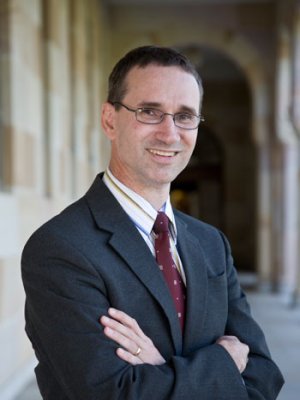
UQ researcher Dr Lane Strathearn sees strengthening the bond between mother and baby as a possible way of reducing childhood neglect.
Dr Strathearn's recently completed PhD identifies how increased pressures placed on mothers by society have reduced the perceived importance of raising children.
"Over the past decade we have seen dramatic changes in the social landscape in which our children are raised, with increasing demands on mothers in particular to balance raising a family with providing an income and meeting educational and career-related demands," Dr Strathearn said.
"I feel that the basic needs of children have fallen lower and lower on the priority list of families and society, with physical or emotional neglect often the unfortunate result.
"This study emphasises the need to address the basic, universal needs of children, and stresses the importance of this early mother-infant relationship.
"Strengthening this crucial relationship may help to prevent some of the long term consequences of neglect that we are seeing more commonly today, such as delinquency, crime, developmental delay and psychiatric disorders."
A father of seven, Dr Strathearn grew up in Redcliffe, studied medicine at UQ and completed paediatric training at the Brisbane Mater Children's Hospital, before heading to the US in 2001.
Now based at Baylor College of Medicine, Texas, he still has close ties to Brisbane, with his PhD completed through UQ's School of Medicine.
Spanning nine years and drawing upon large longitudinal studies based in Brisbane and brain imaging data collected in Houston, Dr Strathearn's research aimed to develop a better understanding of the pervasive problem of child neglect.
One study involved linking data from the Mater-University Study of Pregnancy with reports of child maltreatment from the Department of Child Safety, finding that women who breastfed were less likely to neglect their children.
"Our subsequent study showed that the hormone, oxytocin, which is involved in breastfeeding, is also related to secure attachment in mothers and to brain 'reward' activation when they view pictures of their baby," Dr Strathearn said.
Watching mothers and babies "connect" was one of the most enjoyable parts of the research, Dr Strathearn said.
"Another rewarding experience was conducting the Adult Attachment Interviews with women towards the end of their first pregnancy," he said.
"It was humbling to be privy to some very personal experiences in their lives, including times when they had themselves experienced abuse, neglect or loss during their childhood.
"One goal of this research has been to try to link these early experiences in the mothers with the relationship they develop with their own child, and understand some of the biological mechanisms underlying this connection."
Despite finishing his PhD, Dr Strathearn is continuing to conduct research in this area, currently looking at how the hormone oxytocin may help to reinforce and strengthen the mother-infant bond.
By performing functional MRI brain scans after mothers receive either intranasal oxytocin or a placebo, his team hopes to find out whether the hormone influences how they respond to cues from their baby.
He is also about to commence similar research among a group of cocaine-exposed new mothers, examining the effects of cocaine on mother-infant attachment and the maternal brain.
His PhD was completed under the supervision of Michael O'Callaghan, consultant paediatrician at the Brisbane Mater Hospital and Associate Professor with UQ's Discipline of Paediatrics and Child Health, and Professor Jake Najman from UQ's School of Population Health.
While unable to attend his UQ graduation ceremony in December, Dr Strathearn will be back in Brisbane in mid-March, 2010.
Dr Strathearn has graduated twice in UQ's first 100 years, with his Bachelor of Medicine/Bachelor of Surgery conferred in 1992, and PhD awarded in 2009.
Media: Dr Strathearn (+1 281 725 7435, lstrathearn@hnl.bcm.edu) or Penny Robinson at UQ Communications (07 3365 9723, penny.robinson@uq.edu.au)
.jpg)



